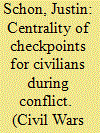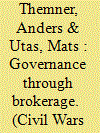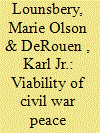|
|
|
Sort Order |
|
|
|
Items / Page
|
|
|
|
|
|
|
| Srl | Item |
| 1 |
ID:
147529


|
|
|
|
|
| Summary/Abstract |
Analyses of the violence–displacement relationship motivate a disaggregation of violence into violence in residential areas (home violence) and violence along migration routes (road violence). These two forms of violence have opposite effects upon displacement, with home violence increasing displacement and road violence decreasing displacement. Yet, conflict scholarship would benefit from additional consideration of the specific activities that constitute road violence. This consideration reveals that road violence primarily involves displacement-deterring violence at checkpoints. This motivates the question: How does checkpoint violence deter displacement? Using interviews with Syrian and Somali refugees, as well as daily data on violence and displacement in Somalia, this paper argues that state and non-state armed groups create and foster uncertainty at checkpoints. Then, they use dramatic violence that is tangible to civilians through their ability to physically see, hear, and smell evidence of it as propaganda. As propaganda, the deterrent effect of checkpoint violence is amplified beyond isolated violent events. More broadly, results from quantitative analysis of the daily data on violence and displacement in Somalia indicate that uncertainty about road violence (road uncertainty) and uncertainty about home violence (home uncertainty) amplify the effects of road violence and home violence, respectively.
|
|
|
|
|
|
|
|
|
|
|
|
|
|
|
|
| 2 |
ID:
147528


|
|
|
|
|
| Summary/Abstract |
There is currently a lack of knowledge about how elites rule post-civil war societies without strong state institutions. This paper argues that elites oftentimes overcome such institutional deficiencies by engaging in governance through brokerage. According to this perspective, elites outsource central state functions to influential broker figures. This is particularly true when dealing with war-affected groups that possess much violent agency. By functioning as social membranes, brokers can help elites and war-affected groups to redefine a new social contract. Liberia is employed as an example to illustrate the paper’s central arguments.
|
|
|
|
|
|
|
|
|
|
|
|
|
|
|
|
| 3 |
ID:
147531


|
|
|
|
|
| Summary/Abstract |
This article explores the relationship between ethnic representation in security sector institutions and perceptions of safety. While most studies on post-conflict institutional reform focus on national institutions and outcomes, this article argues that a more nuanced view on ethnic representation is fruitful in order to account for the everyday perceptions of local people. Drawing on post-conflict Kosovo, the article analyzes how the representation of ethnic minorities in security institutions affects perceptions of safety among individuals across Kosovo’s municipalities. It also analyzes original interview data collected in the Pristina and Mitrovica municipalities that are typical cases of our sample. Both approaches validate that those municipalities that have ethnically representative security institutions also have higher levels of perceived safety.
|
|
|
|
|
|
|
|
|
|
|
|
|
|
|
|
| 4 |
ID:
147532


|
|
|
|
|
| Summary/Abstract |
This paper argues that current academic definitions of civil war are largely inadequate for international relations practitioners. While these casualty-based standards have the methodological consistency needed for quantitative research, they do not capture the dynamics most important to policymakers, including the degree of threat to national interests, the level of disruption to the international system, and the political implications of labelling a conflict a civil war. This paper explains how academics and practitioners use civil war definitions in different ways, creating the need for an additional but non-exclusive practitioner-centric definition of civil war. Its purpose is not to replace the existing academic standard, but rather to provide an additional tool for policymakers tailored to their specific needs – identifying when a civil war has emerged in order to implement a policy response.
|
|
|
|
|
|
|
|
|
|
|
|
|
|
|
|
| 5 |
ID:
147530


|
|
|
|
|
| Summary/Abstract |
Civil war peace agreements are prone to collapse. While some research suggests that multiple layers of power-sharing provisions lead to more viable agreements, others have suggested that negotiated settlements are not only more likely to return to violence, but that those cases will be more deadly as a result. We suggest here that previous research has failed to address the various ways that peace agreements emerge and that this context is crucial in explaining peace agreement viability. In some situations, rebels are likely to earn those concessions through battlefield success. Governments may feel compelled to address underlying grievances in order to stop the bloodshed and ultimately maintain some political clout in the postwar regime. In other cases, however, governments may feel pressure to engage in discussions and to provide concessions by outside actors, whether in the form of diplomatic intervention, economic, or foreign military intervention. Hypotheses are tested on all civil war peace agreements identified by the UCDP Peace Agreement Data-set for 1975–2011. Findings from logit and hazard models suggest that agreements brought about in the aftermath of military intervention on behalf of rebels are more likely to endure while those earned on the battlefield (i.e., stronger rebels) do not. In addition, mediation enhances peace agreement viability, while interventions on behalf of governments tend to undermine it.
|
|
|
|
|
|
|
|
|
|
|
|
|
|
|
|
|
|
|
|
|